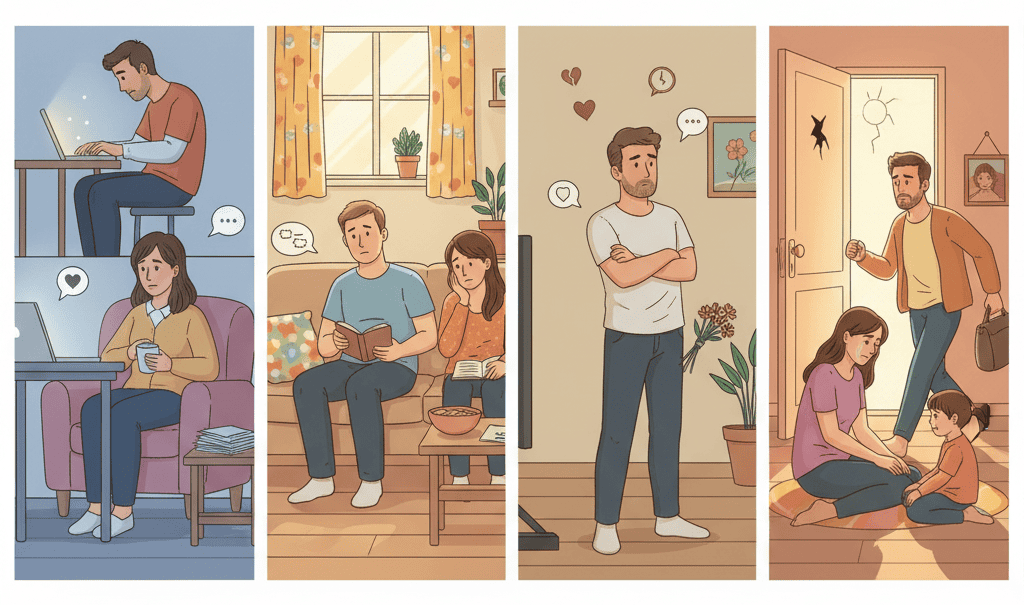Where Every Connection Becomes a Bond

You can feel it—even if you can’t name it.
Something is missing. He provides. He shows up. He might even be attentive. But there’s something absent in the way he loves you. It’s not the kind of love that makes you feel chosen. It’s not the kind of love that makes you feel safe. It’s something else entirely.
Not all men who stay in marriages truly love their wives.
This isn’t always because they’re bad people (though some are). Sometimes it’s because they’re broken. Sometimes it’s because they’ve built their entire identity on a lie. Sometimes it’s because they’re incapable of the kind of vulnerability that real love requires. And sometimes, it’s because they never actually loved you to begin with.
Understanding the different types of men who don’t fully love their wives—even when they’re married to them—can help you recognize patterns, understand what’s happening in your relationship, and make decisions from clarity instead of confusion.
Let’s explore the most common archetypes.
1. The Narcissist: Love is a Reflection of Himself
The narcissistic man doesn’t love his wife—he loves what his wife represents.
She’s a reflection of his status. She validates his importance. She makes him look good. She’s “furniture in his life”—a permanent fixture that enhances his self-image.
But she’s not a person to him. She’s an accessory. He views women as objects, not humans with their own needs, dreams, and worth. And because he lacks empathy, he can’t access genuine love. Love requires seeing someone for who they truly are and valuing that person. Narcissists are incapable of this.
The narcissistic man will cheat without guilt. He believes he’s entitled to do whatever he wants. His wife’s feelings don’t factor into his calculations. He’s incapable of genuine remorse because he doesn’t actually believe he’s done anything wrong.
If you’re married to a narcissist, understand this: you cannot change him. He doesn’t want to be changed. And therapy won’t help because he doesn’t believe anything is wrong with him.
2. The Emotionally Avoidant Man: Love Feels Like Imprisonment
This man fears intimacy the way other men fear death.
Emotional closeness triggers something in him—perhaps a childhood wound around his mother, or fear of losing himself if he truly connects. So he maintains distance. Not through cruelty, but through emotional unavailability.
He can have sex with you—physical intimacy doesn’t require emotional vulnerability. But he can’t be truly known. He won’t share his fears, his dreams, or his insecurities. He keeps parts of himself locked away, even in marriage.
When he cheats, it’s often with women who don’t represent intimacy. It’s about the thrill, the novelty, the escape—anything but genuine emotional connection. Because actual connection feels suffocating to him.
This man might care about you in his own way. But he doesn’t love you in the way love requires: full presence, vulnerability, and the willingness to be deeply known.
3. The Sociopathic Cheater: Love Was Always a Performance
This is the most dangerous type because he’s actually a con artist disguised as a husband.
He married you because it benefited him—your stability, your resources, your respectability. But he never actually loved you. He performed love. He charmed you. He made you believe he was someone he wasn’t.
The sociopathic man views his wife as just another mark. He’ll drain resources if he can. He might be married to multiple people simultaneously. He views betrayal not as morally wrong, but as a strategy—a way to get what he wants.
He won’t feel guilty. He won’t experience remorse. He won’t consider your pain. Because genuine human connection is beyond his capacity. He’s a predator in a husband’s body.
If you’re in a relationship with a sociopath, the only path forward is exit. There is no redemption arc here, no possibility of change. You’ve been targeted, not loved.
4. The Sex Addict: Love is Secondary to the Fix
This man experiences sex differently than other men. For him, it’s an addiction—a neurological compulsion he can’t control.
He might genuinely love his wife. But he loves the high of novelty, the rush of conquest, the intensity of secrecy more. He’s trapped in a cycle where his brain has been rewired to seek the dopamine hit that infidelity provides.
He’ll cheat repeatedly, not because he doesn’t love you, but because he’s caught in a compulsive pattern he genuinely struggles to stop. Each affair creates more neurological pathways that pull him toward repetition.
The sex addict differs from other cheaters because he can actually feel genuine guilt and remorse. He loves his wife but hates himself for what he does. This internal conflict is real—but it doesn’t stop the behavior.
This type of man needs intervention, therapy, and often support groups. Change is possible, but only if he’s willing to address the addiction head-on.
5. The Disgruntled Spouse: Love Died, But He Stayed
This man used to love his wife. But somewhere along the way, the connection broke.
Maybe his needs weren’t being met. Maybe she became a business partner instead of a lover. Maybe they stopped communicating and started coexisting. The emotional distance grew so wide that he couldn’t bridge it anymore.
Rather than address it or leave, he looked outside the marriage. Not because he stopped loving overnight, but because he was dealing with his pain in an unhealthy way.
This man might feel trapped. He might be staying for the kids, for financial reasons, or because of commitment vows. But he’s not actually in the marriage anymore. He’s going through the motions while his heart is engaged elsewhere.
The key difference between this man and the narcissist is that he can usually feel guilt and regret. He can recognize that what he’s doing is wrong. But he’s stuck—caught between the pain of staying and the terror of leaving.
6. The Pleaser: He Can’t Say No to Anything
This man doesn’t have healthy boundaries. He’s so focused on people-pleasing and avoiding conflict that he can’t say no to advances from other women.
It’s not that he wants to cheat. But when someone comes onto him, the thought of disappointing that person paralyzes him. So he goes along with it. Then he feels trapped in the affair because ending it would hurt the other person’s feelings.
His wife isn’t being betrayed because he doesn’t love her. She’s being betrayed because he’s too emotionally immature to establish boundaries and stand up for his marriage.
This man needs to develop emotional intelligence and learn that saying no to others is sometimes the most loving thing he can do for his primary relationship.
7. The Man with Unresolved Maternal Wounds
His relationship with his mother was complicated or damaged. And now he carries distrust of women—and specifically wives—as a result.
If his mother abandoned him, he subconsciously expects all women to abandon him. If she was controlling, he feels the need to maintain power through deception and infidelity. If she was unreliable, he doesn’t fully trust his wife and reserves parts of himself for other women as insurance.
He might stay in the marriage, but he won’t give his whole self. He’s hedging his bets, keeping emotional distance as protection against the inevitable betrayal he expects.
This man can change—but only if he does deep work to heal his maternal wound and examine how that wound affects his capacity to love his wife.
What All of These Men Have in Common
Despite their differences, all of these types share something: they either don’t know how to love, or they don’t want to love, or they’ve made a fundamental choice to love themselves more than they love their wives.
Some are dangerous predators. Some are deeply broken. Some are trapped in patterns they don’t know how to escape. But regardless of category, the impact on their wives is similar: a marriage that looks intact on the outside but feels hollow on the inside.
If You’re Married to One of These Men
First, understand that his inability or unwillingness to love you is not a reflection of your worth.
You could be perfect and he still wouldn’t be capable of loving you the way you deserve. This is about who he is, not who you are.
Second, recognize which type he is. Not all types are redeemable. The sociopath is beyond help. The narcissist won’t change. But the disgruntled spouse, the pleaser, and the man with maternal wounds—these types can potentially access their capacity to love through professional help and genuine self-examination.
Finally, decide what you’re willing to tolerate. You don’t have to stay. You don’t have to wait for him to figure out how to love you. You can prioritize your own peace, your own healing, and your own life—with or without him.
The saddest marriages aren’t always the ones where there’s conflict. They’re the ones where one person—or both—has stopped trying to truly love the other.
Don’t spend your life waiting for him to become capable of what he may never be able to give you.




